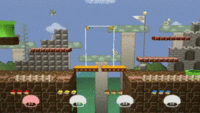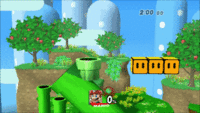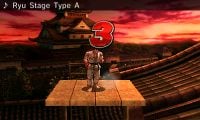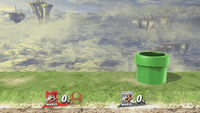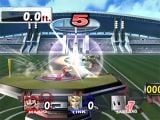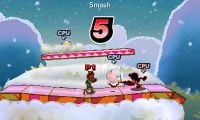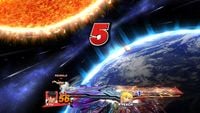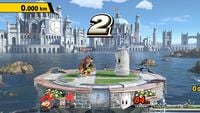Match timer

The match timer is an element that appears in the top-right corner of the screen (top-center in Melee). It shows how much time is left during a game before it ends. It is present during a Time or Stock battle with the timer option set to on. The timer starts counting down once the announcer says "GO!". The timer can be adjusted between a minimum of 1 and maximum of 99 minutes (thirty-second intervals in Ultimate) in the Rules section prior to the start of the match. Normally the format of the timer is "MM:SS.ss" (minutes, seconds, centiseconds). In Smash 4, if the timer exceeds 60 minutes, it will include the number "1" to display the hour instead of the usual format. In addition to Versus matches, the timer can also appear with predetermined time limits in minigames like Trophy Rush and Target Blast, or boss battles such as Master Core, as well as on the Online Practice Stage when waiting in a lobby for the current match to end. There are instances throughout the series of unique time-based gameplay settings.
Depending on region and language, timers are different audibly. While numbers stay the same visually, text such as "GO!" or spoken numbers by the announcer greatly vary. For simplicity reasons, only English is presented in this article.
Pre-match timer
The pre-match timer is an element that appears before the start of a match. The announcer will count down starting from three. Depending on which game, characters will make their on-screen appearance during this time, and the music track will be briefly displayed in the top left-hand corner as well (Brawl, Smash 4, and Ultimate). Prior to the start of the countdown in Ultimate, a versus splash screen will appear, showing the fighters for that match. When the announcer gives the "GO!" signal and when the word appears onscreen, the match begins, as well as the match timer if applicable.
In Super Smash Bros., the timer uses a light sequence starting from red and while the announcer counts down, the lights will change to yellow from left to right. When the light turns blue, the match begins.
In Super Smash Bros. Melee, the announcer says "Ready...Go!" instead of counting down from three after the character trophies "come to life", and the announcer says "Sudden Death...Go!" after the character’s ending in a tie. A meter is shown visually onscreen to be counting down from three, displaying the time with centiseconds, though this is purely aesthetic and counts down quickly in less than three seconds. This variation is also used in Brawl, Smash 4, and Ultimate during single-player modes including All-Star and Adventure Mode: World of Light. On-screen appearances will be absent from this countdown method. Quicker appearances are only in single player modes and versus modes in Melee on this "Ready...Go!" method and "Sudden Death...Go!" method.
In Super Smash Bros. Brawl, the pre-match timer uses numbers and has different colors for each of them: three (blue), two (green) and one (yellow). All numbers are red in Smash 4, and then to flaming orange-red in Ultimate.
When "GO!" appears onscreen, it will have a different color depending on which game: vermilion (Super Smash Bros.), blackish-yellow, (Melee), brown (Brawl), silver (Smash 3DS), gold (Smash for Wii U), and flaming orange-red (Ultimate).
- NessOnScreenAppearanceMelee.gif
In Melee and single-player modes since Brawl.
- MiiBrawlerPokémonStadiumUltimate.jpg
In Ultimate.
Final countdown timer
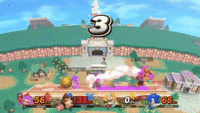
The final countdown timer is an element that appears at the end of a match. When there are only five seconds remaining, the match timer will disappear (except for Super Smash Bros.), and the announcer will start to count down with each number getting bigger onscreen (the numbers are the same size in Smash for Wii U and Ultimate) before calling out "TIME!" ("TIME UP!" in the Chinese, Korean and Japanese versions and the original game) to signal the end of the match. When that word appears onscreen, a winner will be chosen based on the highest total score each fighter/team has during the match, depending on the game mode. Players who are tied will face off in a Sudden Death match to break the tie.
In competitive play, this event is usually referred to as a "time out"; sometimes it is performed intentionally in order to win by stock or percentage lead alone. In addition to VS. matches, the timer appears in single-player modes like Race to the Finish and Trophy Rush. If Target Blast and the Home-Run Contest is played, then "TIME!" won't be called after the last second appeared. If a timed Multi-Man game is played, then the announcer will call out "GAME!" ("GAME SET" in the Japanese version and in the original game) when time is up.
Just like the pre-match timer and the "GO!" message, the numbers have a different color. In Melee, the numbers are crimson before it was changed to red in Brawl and SSB4, and then to silver in Ultimate. The 10-second timer on the bomb in Target Blast starts from green and for each second the fuse takes, it changes to yellow, orange, and then to red when the bomb explodes. In SSB4, the final countdown timer's appearance activates the countdown-affected equipment, and prevents Star KOs and Screen KOs from happening for fairness purposes. This also applies to the Finish Zoom in Ultimate. There is only one known exception to this.
- MarioHomeRunContestMeleeLastSecond.jpg
In Melee
Gallery
Trivia
- When there's only thirty seconds left in Smash 64, twenty seconds left in Melee, the current music changes on some stages. This applies to five stages: Mushroom Kingdom, Mushroom Kingdom, Mushroom Kingdom II, Suzaku Castle, and Moray Towers.
- In Suzaku Castle's case, this only happens if the music currently playing is any of the original Street Fighter II or Super Street Fighter II themes (barring the Player Select theme from either game in Ultimate).
- In Moray Towers' case, this happens if the music currently playing is directly ported from Splatoon or Splatoon 2 (with the exceptions of Split & Splat, Octoweaponry, I Am Octavio, Calamari Inkantation, and Deluge Dirge).
